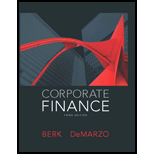
Concept explainers
Assume that all investors have the same information and care only about expected return and volatility. If new information arrives about one stock, can this information affect the price and return of other stocks? If so, explain why?
To determine: To respond to the given statement.
Statement: Can the stock prices and stock returns affect if any new information arrives regarding the stock?
Introduction: Expected return is the method of finding the average anticipated probability of several diverse interest rates that are probable on a particular asset. The issues in such persistence comprise of dissimilar market environments that includes the beta of an asset.
Answer to Problem 1P
Answer: Yes, the stock prices and stock returns affect if any new information arrives regarding the stock.
Explanation of Solution
Yes, the stock prices and stock returns affect if any new information arrives regarding the stock.
Following are the reasons that suggest that the stock prices and stock returns affect if any new information arrives regarding the stock:
- If the other stock prices remain constant, the shareholders will prefer to raise the weight of the stock by indicating not to hold the market portfolio.
- As a result of the arrival of new information, it modifies the stock’s appearance.
Want to see more full solutions like this?
Chapter 13 Solutions
Corporate Finance
- Finance Subject.Which of the following is a money market instrument?A) Treasury bondsB) Corporate bondsC) Commercial paperD) Common stockarrow_forwardHelp please without use of AI. no What is the main purpose of financial ratios?A) To guarantee a company's profitabilityB) To evaluate a company's financial performance and healthC) To increase a company's stock priceD) To ensure a company's debts are eliminatedarrow_forwardPlease don't use ai tool If a stock’s beta is 1.5, what does this indicate?A) The stock is less volatile than the marketB) The stock is more volatile than the marketC) The stock is not correlated with the market D) The stock is risk-freearrow_forward
- No ai What is the primary function of a financial market?A) To set interest ratesB) To facilitate the transfer of funds between savers and borrowersC) To regulate the banking industryD) To manage the government’s budgetarrow_forwardno What is the main purpose of financial ratios?A) To guarantee a company's profitabilityB) To evaluate a company's financial performance and healthC) To increase a company's stock priceD) To ensure a company's debts are eliminatedarrow_forwardplease don't use chatgpt What happens to the value of money when inflation increases?A) The value of money increasesB) The value of money decreasesC) The value of money remains unchangedD) The value of money fluctuates randomly helparrow_forward
- Do not use Ai tool What happens to the value of money when inflation increases?A) The value of money increasesB) The value of money decreasesC) The value of money remains unchangedD) The value of money fluctuates randomlyarrow_forwardNo AI tool. Which of the following best defines a bond's coupon rate?A) The market rate of interest on the bondB) The annual interest payment as a percentage of the bond's face valueC) The difference between the bond's face value and its market priceD) The total return from holding the bond to maturityarrow_forwardNo ai!! answer it A portfolio's risk can be reduced by: A) Investing in a single stock B) Diversifying investments across different asset classes C) Borrowing money to invest more D) Only investing in high-risk assets need help.arrow_forward
- No chatgpt! A portfolio's risk can be reduced by: A) Investing in a single stock B) Diversifying investments across different asset classes C) Borrowing money to invest more D) Only investing in high-risk assets need help!arrow_forwardNo chatgpt!! A portfolio's risk can be reduced by:A) Investing in a single stockB) Diversifying investments across different asset classesC) Borrowing money to invest moreD) Only investing in high-risk assetsarrow_forwardNo chatgpt!! A company’s ability to meet its short-term financial obligations is referred to as: A) ProfitabilityB) LiquidityC) SolvencyD) Efficiency solvearrow_forward
 EBK CONTEMPORARY FINANCIAL MANAGEMENTFinanceISBN:9781337514835Author:MOYERPublisher:CENGAGE LEARNING - CONSIGNMENT
EBK CONTEMPORARY FINANCIAL MANAGEMENTFinanceISBN:9781337514835Author:MOYERPublisher:CENGAGE LEARNING - CONSIGNMENT Intermediate Financial Management (MindTap Course...FinanceISBN:9781337395083Author:Eugene F. Brigham, Phillip R. DavesPublisher:Cengage Learning
Intermediate Financial Management (MindTap Course...FinanceISBN:9781337395083Author:Eugene F. Brigham, Phillip R. DavesPublisher:Cengage Learning

